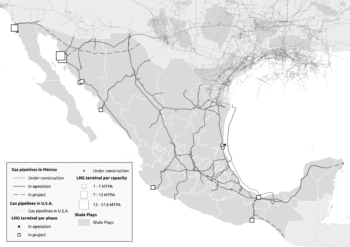February 1, 2026
Using historical databases and quantitative analysis, Thomas E. Lambert calls into question the assertion that the trans-Atlantic slave trade can be considered a separate phenomenon from, rather than a major supporting factor in, the Industrial Revolution in England. Asserting otherwise, he writes, is a to deny "a horrifying and inhuman part of the global history of capitalism."
January 1, 2026
David E. Perlman and Ashly Vigneault explore the linkages between humanity's metabolic rift with nature and the accelerating emergence of epidemics, which are fundamentally related to the capitalist mode of production and concomitant alienated social metabolism. Using historical and epidemiological research that extends from the rise of the bubonic plague to the emergence of COVID-19, Perlman and Vigneault are able to deftly tie these concepts to the breach of planetary boundaries that threatens all of humanity.
January 1, 2026
Mateo Crossa delineates the history of U.S. imperialism in Mexico through the lens of its domination of the fossil fuel industry, particularly by way of the Shale Revolution and the advent of fracking. "By engineering new regional dependencies and reshaping energy alliances to suit is strategic ambitions," Crossa writes, "the United States weaponized its command over natural gas to deepen its grip on the global fossil energy system and reinforce its imperial reach."
December 1, 2025
Matthew Rothschild looks back on nearly 40 years working alongside his friend and colleague Robert W. McChesney. McChesney, he writes, brought to the world a sharp analysis of not only the contradiction between corporate media and democracy, but between the capitalist system as a whole and a true democracy that serves the people.
December 1, 2025
In this transcript of a talk from 2015, Robert W. McChesney discusses the "great definitional communication revolutions" that have shaped humanity's trajectory. Even a decade ago, McChesney was able to see the fraught relationship between new technology and democracy, the re-emergence of fascism, and the political dangers of the Digital Age.
November 1, 2025
It is a commonplace that the world in the first quarter of the twenty-first century is facing multiple, multifaceted crises, threatening all world civilization and the future of humanity itself. So omnipresent is the contemporary world disorder that received ideology has settled on a single word to describe it: “polycrisis.” Anyone who wants to know what polycrisis is and where it comes from will inevitably run up against a blank wall. For the establishment, the vacuousness of the concept of polycrisis is its primary value.
November 1, 2025
In Aeschylus’s play
Prometheus Bound, the Prometheus is a revolutionary figure. Defying divine interdiction to bring fire to humanity, the Titan has since been adopted by thinkers from the Enlightenment to today to represent revolutionary forces in human existence. So, John Bellamy Foster asks in November’s Review of the Month, what is “Prometheanism,” and how has the term been used (and misused) in discussions of Marx, the ecological crisis, and sustainable human development?
November 1, 2025
In this far-reaching analysis, Vijay Prashad enumerates the conditions of the current conjuncture that, despite seemingly intractable capitalist and imperialist hegemony, point to a reinvigorated revolutionary consciousness among the global population. In a world of capitalist degradation, Prashad declares: "A politics to produce dignity is a socialist politics…. Capitalism inherently generates forms of inequality and indignity. Therefore, all undertakings that seek dignity for all are socialist projects."
October 1, 2025
In this month's "Note from the Editors,"
MR editors detail importance of understanding the world's grossly unequal carbon emissions output in terms of class while also recognizing the role of imperialism at the center of the crisis. "The rapidly worsening climate conditions threatening the world population," they write, "can thus be seen as a product of the ongoing
class war perpetuated by the 'billionaire class' against working people everywhere."
October 1, 2025
In this interview with Xu Tao and Lv Jiayi, John Bellamy Foster discuss the history and present of ecological Marxism. Foster explores origins of the term
Anthropocene and its predecessors, the concept of degrowth, the continuing influence of metabolic rift theory, and the cutting-edge issues facing young scholars of degrowth today.










